Reflection on a Performance Review: Human Services Research Report
VerifiedAdded on 2021/06/16
|7
|1816
|21
Report
AI Summary
This report provides a reflection on a student's experience with a performance review in a human services context. The student analyzes the review, discussing the challenges faced, particularly regarding communication, listening skills, and emotional management during the feedback session. The report delves into the importance of effective listening, conflict resolution, and negotiation skills, identifying the student's weaknesses in these areas. It then outlines a plan for self-improvement, including strategies for enhancing listening skills, improving conflict resolution techniques, and developing negotiation confidence. The report concludes by emphasizing the need to address these weaknesses to achieve professional goals. This report is a valuable resource for students looking to improve their leadership and communication skills.
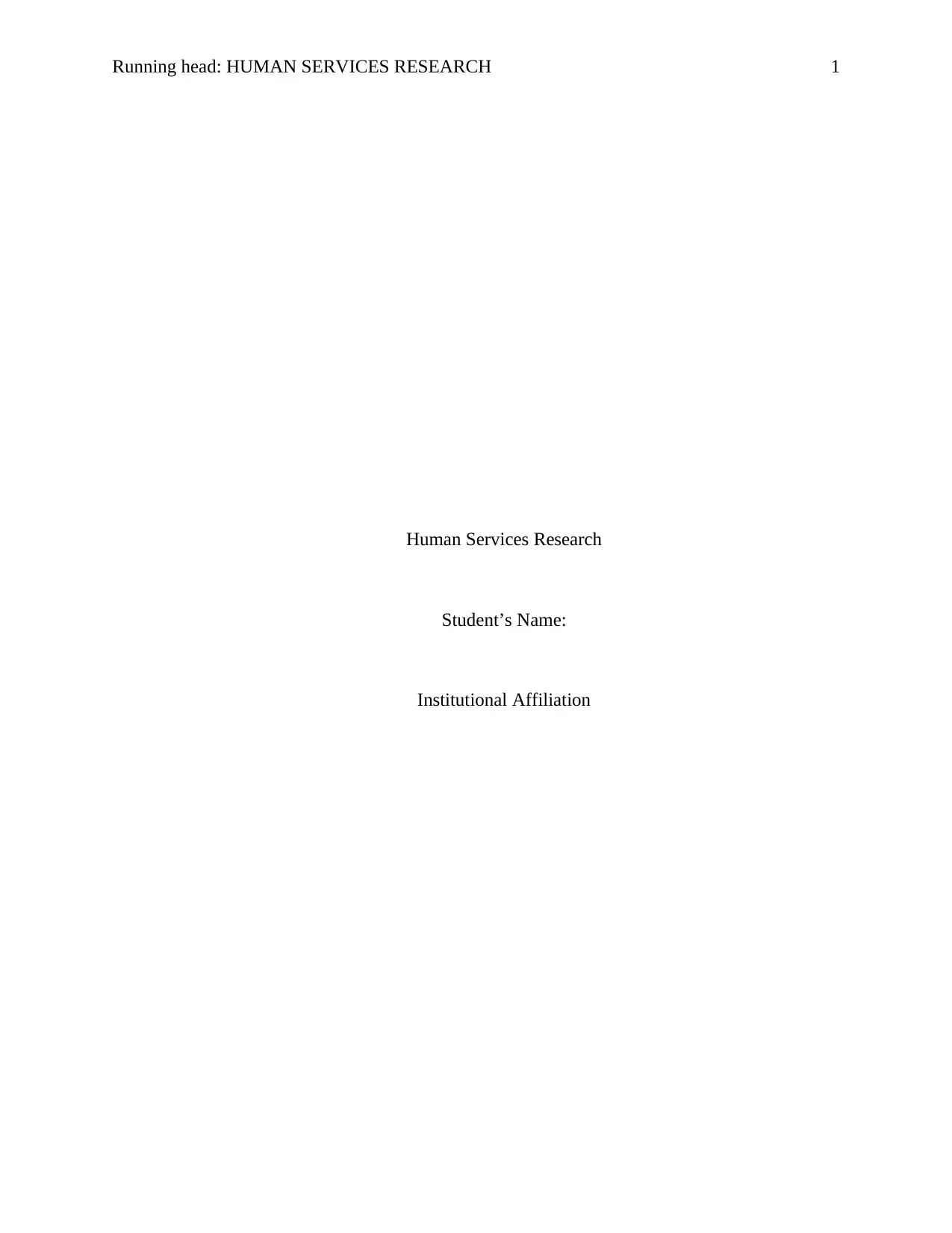
Running head: HUMAN SERVICES RESEARCH 1
Human Services Research
Student’s Name:
Institutional Affiliation
Human Services Research
Student’s Name:
Institutional Affiliation
Paraphrase This Document
Need a fresh take? Get an instant paraphrase of this document with our AI Paraphraser
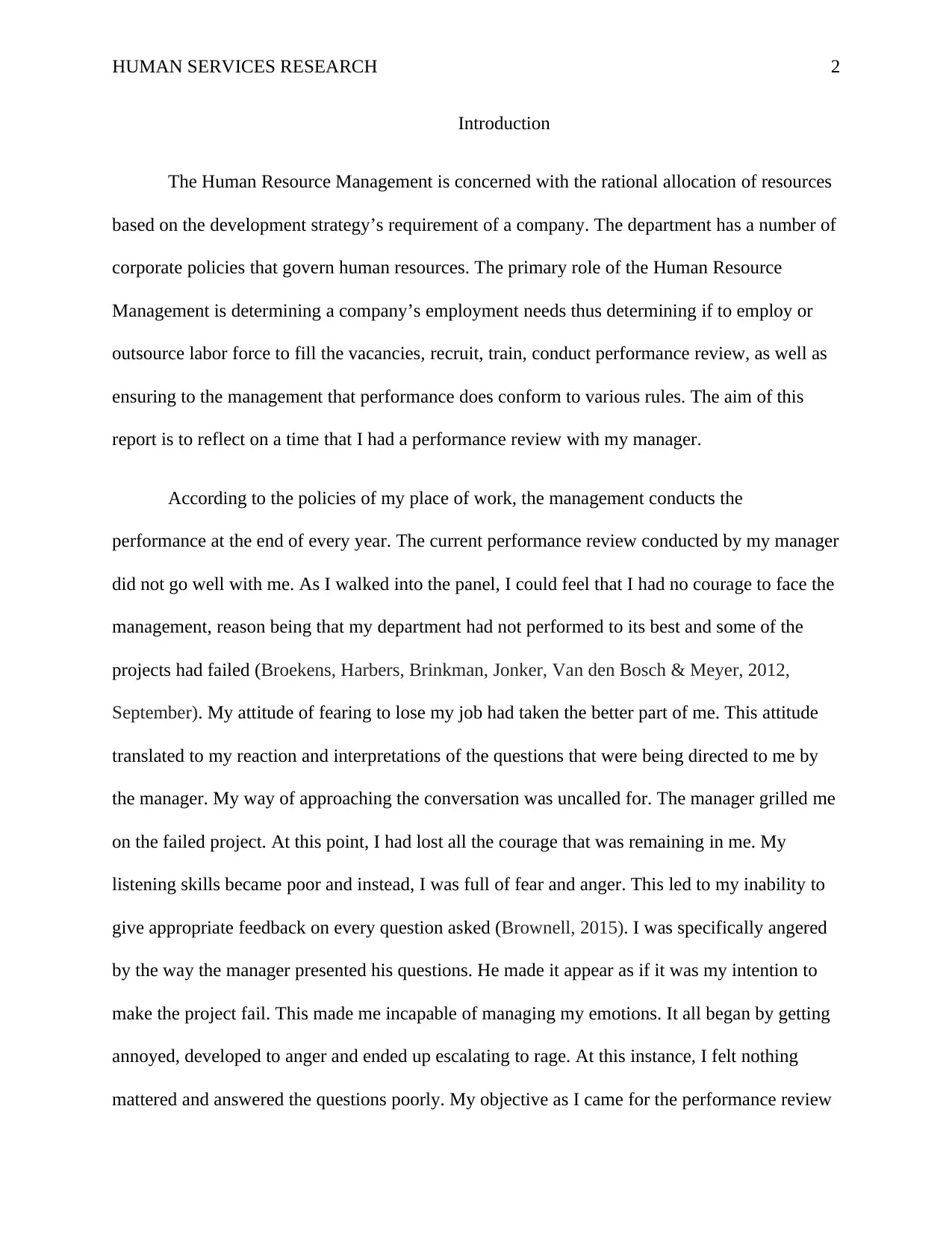
HUMAN SERVICES RESEARCH 2
Introduction
The Human Resource Management is concerned with the rational allocation of resources
based on the development strategy’s requirement of a company. The department has a number of
corporate policies that govern human resources. The primary role of the Human Resource
Management is determining a company’s employment needs thus determining if to employ or
outsource labor force to fill the vacancies, recruit, train, conduct performance review, as well as
ensuring to the management that performance does conform to various rules. The aim of this
report is to reflect on a time that I had a performance review with my manager.
According to the policies of my place of work, the management conducts the
performance at the end of every year. The current performance review conducted by my manager
did not go well with me. As I walked into the panel, I could feel that I had no courage to face the
management, reason being that my department had not performed to its best and some of the
projects had failed (Broekens, Harbers, Brinkman, Jonker, Van den Bosch & Meyer, 2012,
September). My attitude of fearing to lose my job had taken the better part of me. This attitude
translated to my reaction and interpretations of the questions that were being directed to me by
the manager. My way of approaching the conversation was uncalled for. The manager grilled me
on the failed project. At this point, I had lost all the courage that was remaining in me. My
listening skills became poor and instead, I was full of fear and anger. This led to my inability to
give appropriate feedback on every question asked (Brownell, 2015). I was specifically angered
by the way the manager presented his questions. He made it appear as if it was my intention to
make the project fail. This made me incapable of managing my emotions. It all began by getting
annoyed, developed to anger and ended up escalating to rage. At this instance, I felt nothing
mattered and answered the questions poorly. My objective as I came for the performance review
Introduction
The Human Resource Management is concerned with the rational allocation of resources
based on the development strategy’s requirement of a company. The department has a number of
corporate policies that govern human resources. The primary role of the Human Resource
Management is determining a company’s employment needs thus determining if to employ or
outsource labor force to fill the vacancies, recruit, train, conduct performance review, as well as
ensuring to the management that performance does conform to various rules. The aim of this
report is to reflect on a time that I had a performance review with my manager.
According to the policies of my place of work, the management conducts the
performance at the end of every year. The current performance review conducted by my manager
did not go well with me. As I walked into the panel, I could feel that I had no courage to face the
management, reason being that my department had not performed to its best and some of the
projects had failed (Broekens, Harbers, Brinkman, Jonker, Van den Bosch & Meyer, 2012,
September). My attitude of fearing to lose my job had taken the better part of me. This attitude
translated to my reaction and interpretations of the questions that were being directed to me by
the manager. My way of approaching the conversation was uncalled for. The manager grilled me
on the failed project. At this point, I had lost all the courage that was remaining in me. My
listening skills became poor and instead, I was full of fear and anger. This led to my inability to
give appropriate feedback on every question asked (Brownell, 2015). I was specifically angered
by the way the manager presented his questions. He made it appear as if it was my intention to
make the project fail. This made me incapable of managing my emotions. It all began by getting
annoyed, developed to anger and ended up escalating to rage. At this instance, I felt nothing
mattered and answered the questions poorly. My objective as I came for the performance review
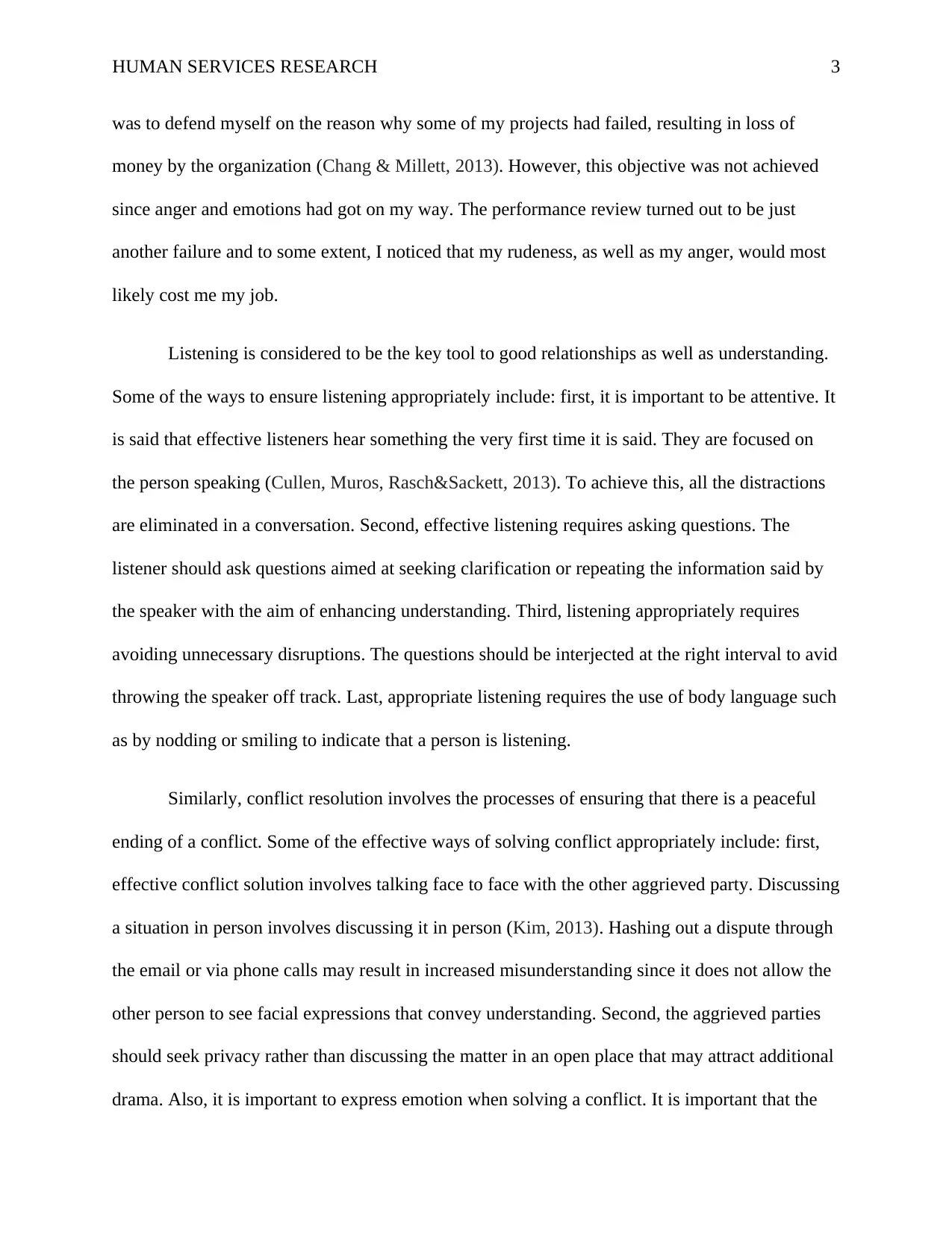
HUMAN SERVICES RESEARCH 3
was to defend myself on the reason why some of my projects had failed, resulting in loss of
money by the organization (Chang & Millett, 2013). However, this objective was not achieved
since anger and emotions had got on my way. The performance review turned out to be just
another failure and to some extent, I noticed that my rudeness, as well as my anger, would most
likely cost me my job.
Listening is considered to be the key tool to good relationships as well as understanding.
Some of the ways to ensure listening appropriately include: first, it is important to be attentive. It
is said that effective listeners hear something the very first time it is said. They are focused on
the person speaking (Cullen, Muros, Rasch&Sackett, 2013). To achieve this, all the distractions
are eliminated in a conversation. Second, effective listening requires asking questions. The
listener should ask questions aimed at seeking clarification or repeating the information said by
the speaker with the aim of enhancing understanding. Third, listening appropriately requires
avoiding unnecessary disruptions. The questions should be interjected at the right interval to avid
throwing the speaker off track. Last, appropriate listening requires the use of body language such
as by nodding or smiling to indicate that a person is listening.
Similarly, conflict resolution involves the processes of ensuring that there is a peaceful
ending of a conflict. Some of the effective ways of solving conflict appropriately include: first,
effective conflict solution involves talking face to face with the other aggrieved party. Discussing
a situation in person involves discussing it in person (Kim, 2013). Hashing out a dispute through
the email or via phone calls may result in increased misunderstanding since it does not allow the
other person to see facial expressions that convey understanding. Second, the aggrieved parties
should seek privacy rather than discussing the matter in an open place that may attract additional
drama. Also, it is important to express emotion when solving a conflict. It is important that the
was to defend myself on the reason why some of my projects had failed, resulting in loss of
money by the organization (Chang & Millett, 2013). However, this objective was not achieved
since anger and emotions had got on my way. The performance review turned out to be just
another failure and to some extent, I noticed that my rudeness, as well as my anger, would most
likely cost me my job.
Listening is considered to be the key tool to good relationships as well as understanding.
Some of the ways to ensure listening appropriately include: first, it is important to be attentive. It
is said that effective listeners hear something the very first time it is said. They are focused on
the person speaking (Cullen, Muros, Rasch&Sackett, 2013). To achieve this, all the distractions
are eliminated in a conversation. Second, effective listening requires asking questions. The
listener should ask questions aimed at seeking clarification or repeating the information said by
the speaker with the aim of enhancing understanding. Third, listening appropriately requires
avoiding unnecessary disruptions. The questions should be interjected at the right interval to avid
throwing the speaker off track. Last, appropriate listening requires the use of body language such
as by nodding or smiling to indicate that a person is listening.
Similarly, conflict resolution involves the processes of ensuring that there is a peaceful
ending of a conflict. Some of the effective ways of solving conflict appropriately include: first,
effective conflict solution involves talking face to face with the other aggrieved party. Discussing
a situation in person involves discussing it in person (Kim, 2013). Hashing out a dispute through
the email or via phone calls may result in increased misunderstanding since it does not allow the
other person to see facial expressions that convey understanding. Second, the aggrieved parties
should seek privacy rather than discussing the matter in an open place that may attract additional
drama. Also, it is important to express emotion when solving a conflict. It is important that the
⊘ This is a preview!⊘
Do you want full access?
Subscribe today to unlock all pages.

Trusted by 1+ million students worldwide
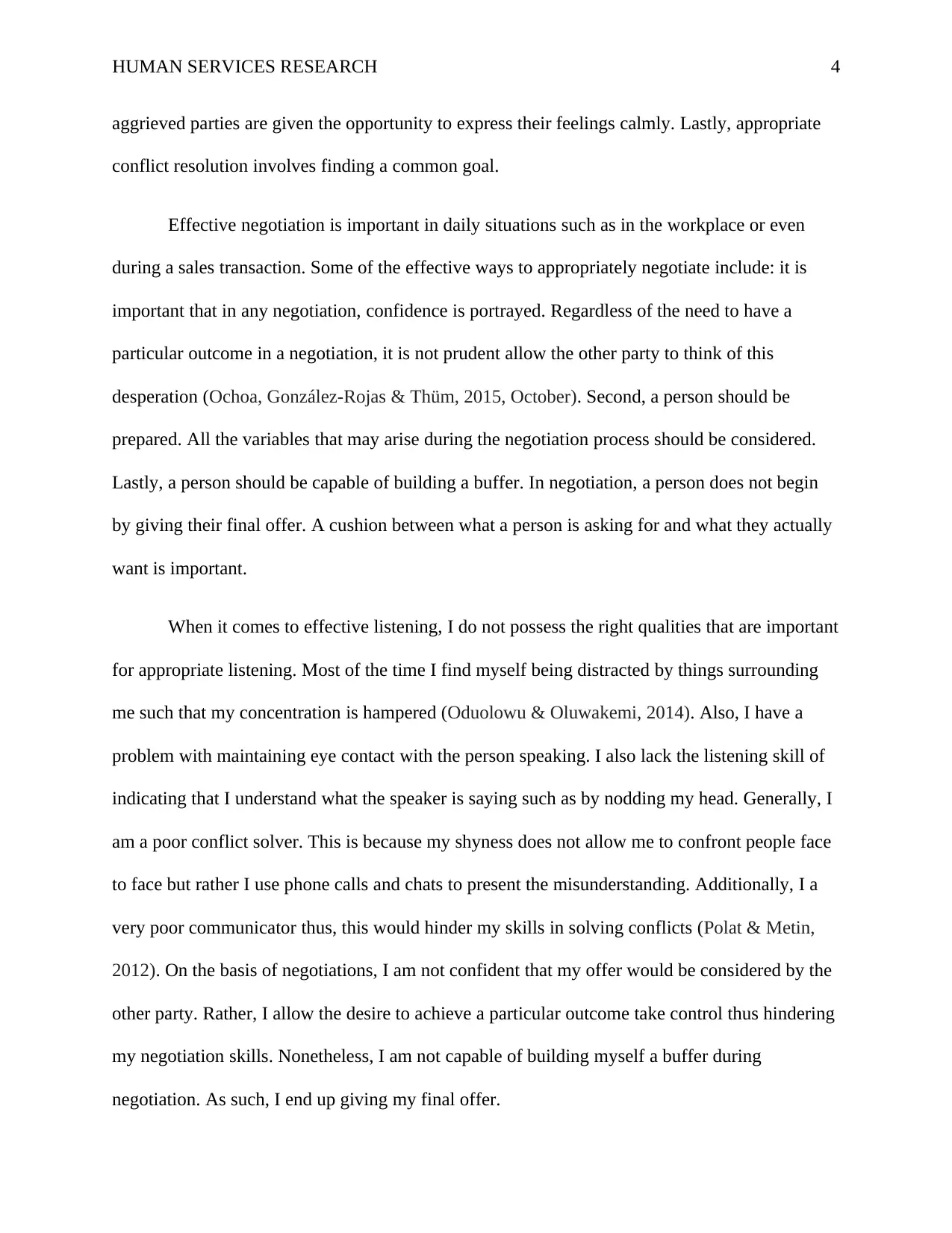
HUMAN SERVICES RESEARCH 4
aggrieved parties are given the opportunity to express their feelings calmly. Lastly, appropriate
conflict resolution involves finding a common goal.
Effective negotiation is important in daily situations such as in the workplace or even
during a sales transaction. Some of the effective ways to appropriately negotiate include: it is
important that in any negotiation, confidence is portrayed. Regardless of the need to have a
particular outcome in a negotiation, it is not prudent allow the other party to think of this
desperation (Ochoa, González-Rojas & Thüm, 2015, October). Second, a person should be
prepared. All the variables that may arise during the negotiation process should be considered.
Lastly, a person should be capable of building a buffer. In negotiation, a person does not begin
by giving their final offer. A cushion between what a person is asking for and what they actually
want is important.
When it comes to effective listening, I do not possess the right qualities that are important
for appropriate listening. Most of the time I find myself being distracted by things surrounding
me such that my concentration is hampered (Oduolowu & Oluwakemi, 2014). Also, I have a
problem with maintaining eye contact with the person speaking. I also lack the listening skill of
indicating that I understand what the speaker is saying such as by nodding my head. Generally, I
am a poor conflict solver. This is because my shyness does not allow me to confront people face
to face but rather I use phone calls and chats to present the misunderstanding. Additionally, I a
very poor communicator thus, this would hinder my skills in solving conflicts (Polat & Metin,
2012). On the basis of negotiations, I am not confident that my offer would be considered by the
other party. Rather, I allow the desire to achieve a particular outcome take control thus hindering
my negotiation skills. Nonetheless, I am not capable of building myself a buffer during
negotiation. As such, I end up giving my final offer.
aggrieved parties are given the opportunity to express their feelings calmly. Lastly, appropriate
conflict resolution involves finding a common goal.
Effective negotiation is important in daily situations such as in the workplace or even
during a sales transaction. Some of the effective ways to appropriately negotiate include: it is
important that in any negotiation, confidence is portrayed. Regardless of the need to have a
particular outcome in a negotiation, it is not prudent allow the other party to think of this
desperation (Ochoa, González-Rojas & Thüm, 2015, October). Second, a person should be
prepared. All the variables that may arise during the negotiation process should be considered.
Lastly, a person should be capable of building a buffer. In negotiation, a person does not begin
by giving their final offer. A cushion between what a person is asking for and what they actually
want is important.
When it comes to effective listening, I do not possess the right qualities that are important
for appropriate listening. Most of the time I find myself being distracted by things surrounding
me such that my concentration is hampered (Oduolowu & Oluwakemi, 2014). Also, I have a
problem with maintaining eye contact with the person speaking. I also lack the listening skill of
indicating that I understand what the speaker is saying such as by nodding my head. Generally, I
am a poor conflict solver. This is because my shyness does not allow me to confront people face
to face but rather I use phone calls and chats to present the misunderstanding. Additionally, I a
very poor communicator thus, this would hinder my skills in solving conflicts (Polat & Metin,
2012). On the basis of negotiations, I am not confident that my offer would be considered by the
other party. Rather, I allow the desire to achieve a particular outcome take control thus hindering
my negotiation skills. Nonetheless, I am not capable of building myself a buffer during
negotiation. As such, I end up giving my final offer.
Paraphrase This Document
Need a fresh take? Get an instant paraphrase of this document with our AI Paraphraser
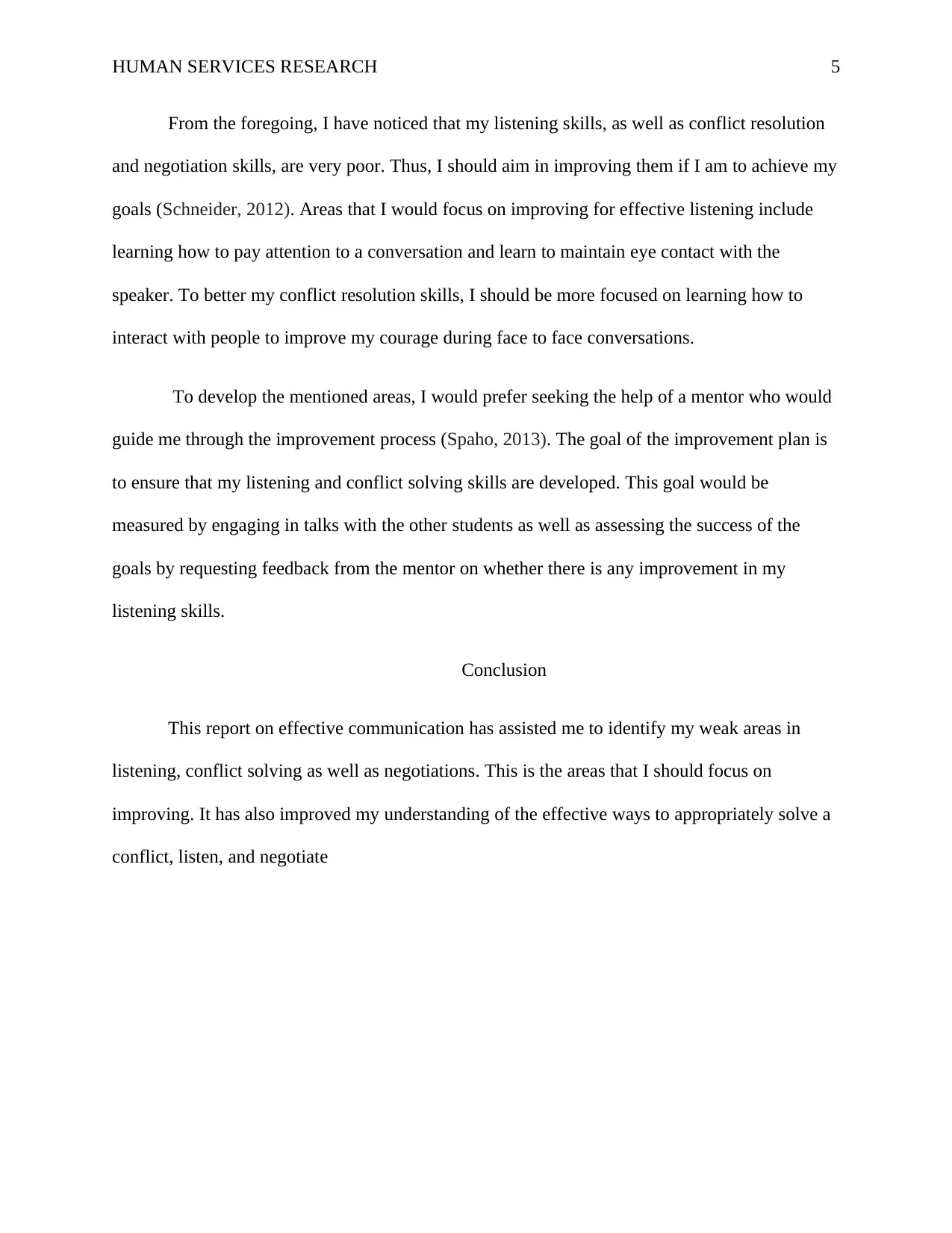
HUMAN SERVICES RESEARCH 5
From the foregoing, I have noticed that my listening skills, as well as conflict resolution
and negotiation skills, are very poor. Thus, I should aim in improving them if I am to achieve my
goals (Schneider, 2012). Areas that I would focus on improving for effective listening include
learning how to pay attention to a conversation and learn to maintain eye contact with the
speaker. To better my conflict resolution skills, I should be more focused on learning how to
interact with people to improve my courage during face to face conversations.
To develop the mentioned areas, I would prefer seeking the help of a mentor who would
guide me through the improvement process (Spaho, 2013). The goal of the improvement plan is
to ensure that my listening and conflict solving skills are developed. This goal would be
measured by engaging in talks with the other students as well as assessing the success of the
goals by requesting feedback from the mentor on whether there is any improvement in my
listening skills.
Conclusion
This report on effective communication has assisted me to identify my weak areas in
listening, conflict solving as well as negotiations. This is the areas that I should focus on
improving. It has also improved my understanding of the effective ways to appropriately solve a
conflict, listen, and negotiate
From the foregoing, I have noticed that my listening skills, as well as conflict resolution
and negotiation skills, are very poor. Thus, I should aim in improving them if I am to achieve my
goals (Schneider, 2012). Areas that I would focus on improving for effective listening include
learning how to pay attention to a conversation and learn to maintain eye contact with the
speaker. To better my conflict resolution skills, I should be more focused on learning how to
interact with people to improve my courage during face to face conversations.
To develop the mentioned areas, I would prefer seeking the help of a mentor who would
guide me through the improvement process (Spaho, 2013). The goal of the improvement plan is
to ensure that my listening and conflict solving skills are developed. This goal would be
measured by engaging in talks with the other students as well as assessing the success of the
goals by requesting feedback from the mentor on whether there is any improvement in my
listening skills.
Conclusion
This report on effective communication has assisted me to identify my weak areas in
listening, conflict solving as well as negotiations. This is the areas that I should focus on
improving. It has also improved my understanding of the effective ways to appropriately solve a
conflict, listen, and negotiate
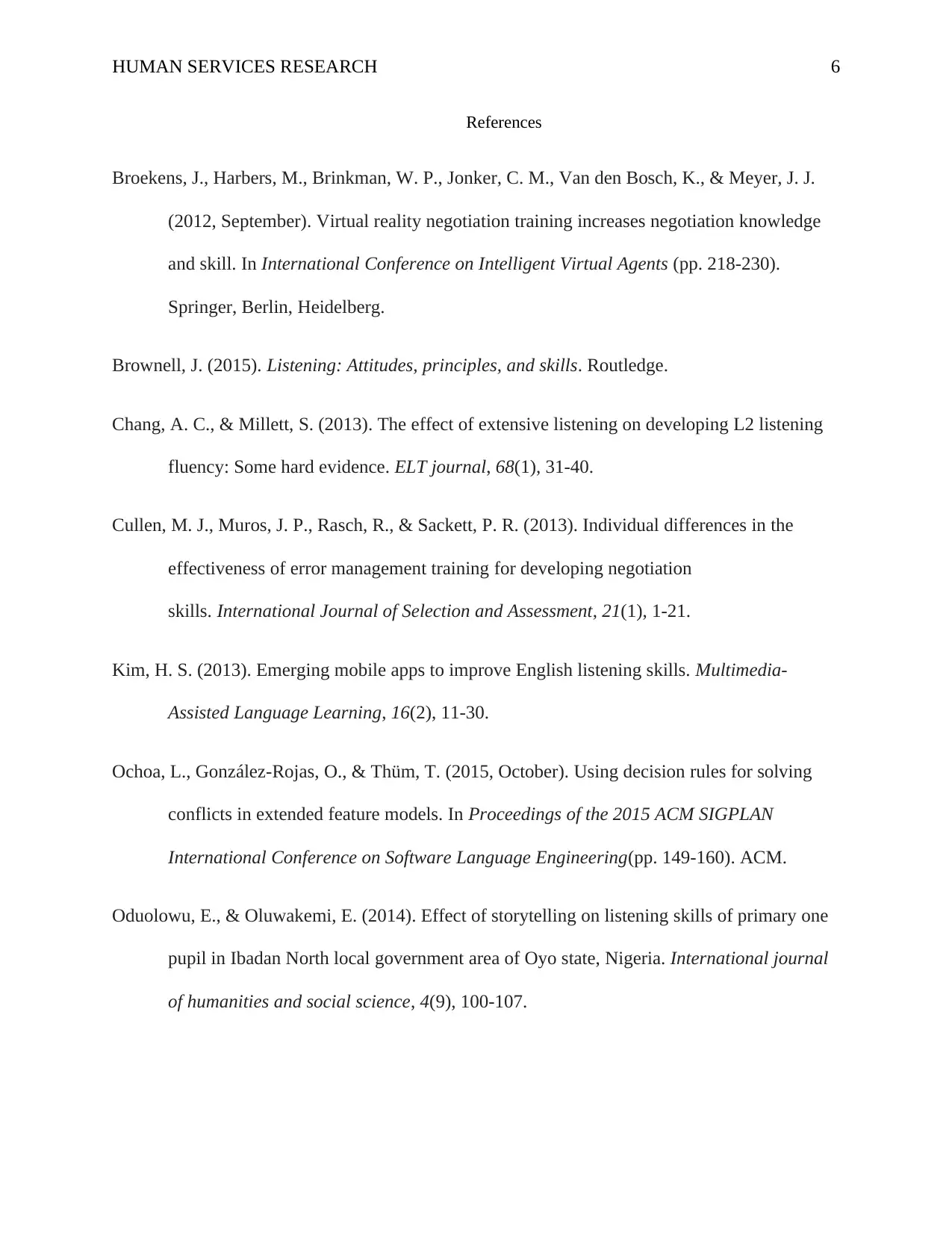
HUMAN SERVICES RESEARCH 6
References
Broekens, J., Harbers, M., Brinkman, W. P., Jonker, C. M., Van den Bosch, K., & Meyer, J. J.
(2012, September). Virtual reality negotiation training increases negotiation knowledge
and skill. In International Conference on Intelligent Virtual Agents (pp. 218-230).
Springer, Berlin, Heidelberg.
Brownell, J. (2015). Listening: Attitudes, principles, and skills. Routledge.
Chang, A. C., & Millett, S. (2013). The effect of extensive listening on developing L2 listening
fluency: Some hard evidence. ELT journal, 68(1), 31-40.
Cullen, M. J., Muros, J. P., Rasch, R., & Sackett, P. R. (2013). Individual differences in the
effectiveness of error management training for developing negotiation
skills. International Journal of Selection and Assessment, 21(1), 1-21.
Kim, H. S. (2013). Emerging mobile apps to improve English listening skills. Multimedia-
Assisted Language Learning, 16(2), 11-30.
Ochoa, L., González-Rojas, O., & Thüm, T. (2015, October). Using decision rules for solving
conflicts in extended feature models. In Proceedings of the 2015 ACM SIGPLAN
International Conference on Software Language Engineering(pp. 149-160). ACM.
Oduolowu, E., & Oluwakemi, E. (2014). Effect of storytelling on listening skills of primary one
pupil in Ibadan North local government area of Oyo state, Nigeria. International journal
of humanities and social science, 4(9), 100-107.
References
Broekens, J., Harbers, M., Brinkman, W. P., Jonker, C. M., Van den Bosch, K., & Meyer, J. J.
(2012, September). Virtual reality negotiation training increases negotiation knowledge
and skill. In International Conference on Intelligent Virtual Agents (pp. 218-230).
Springer, Berlin, Heidelberg.
Brownell, J. (2015). Listening: Attitudes, principles, and skills. Routledge.
Chang, A. C., & Millett, S. (2013). The effect of extensive listening on developing L2 listening
fluency: Some hard evidence. ELT journal, 68(1), 31-40.
Cullen, M. J., Muros, J. P., Rasch, R., & Sackett, P. R. (2013). Individual differences in the
effectiveness of error management training for developing negotiation
skills. International Journal of Selection and Assessment, 21(1), 1-21.
Kim, H. S. (2013). Emerging mobile apps to improve English listening skills. Multimedia-
Assisted Language Learning, 16(2), 11-30.
Ochoa, L., González-Rojas, O., & Thüm, T. (2015, October). Using decision rules for solving
conflicts in extended feature models. In Proceedings of the 2015 ACM SIGPLAN
International Conference on Software Language Engineering(pp. 149-160). ACM.
Oduolowu, E., & Oluwakemi, E. (2014). Effect of storytelling on listening skills of primary one
pupil in Ibadan North local government area of Oyo state, Nigeria. International journal
of humanities and social science, 4(9), 100-107.
⊘ This is a preview!⊘
Do you want full access?
Subscribe today to unlock all pages.

Trusted by 1+ million students worldwide
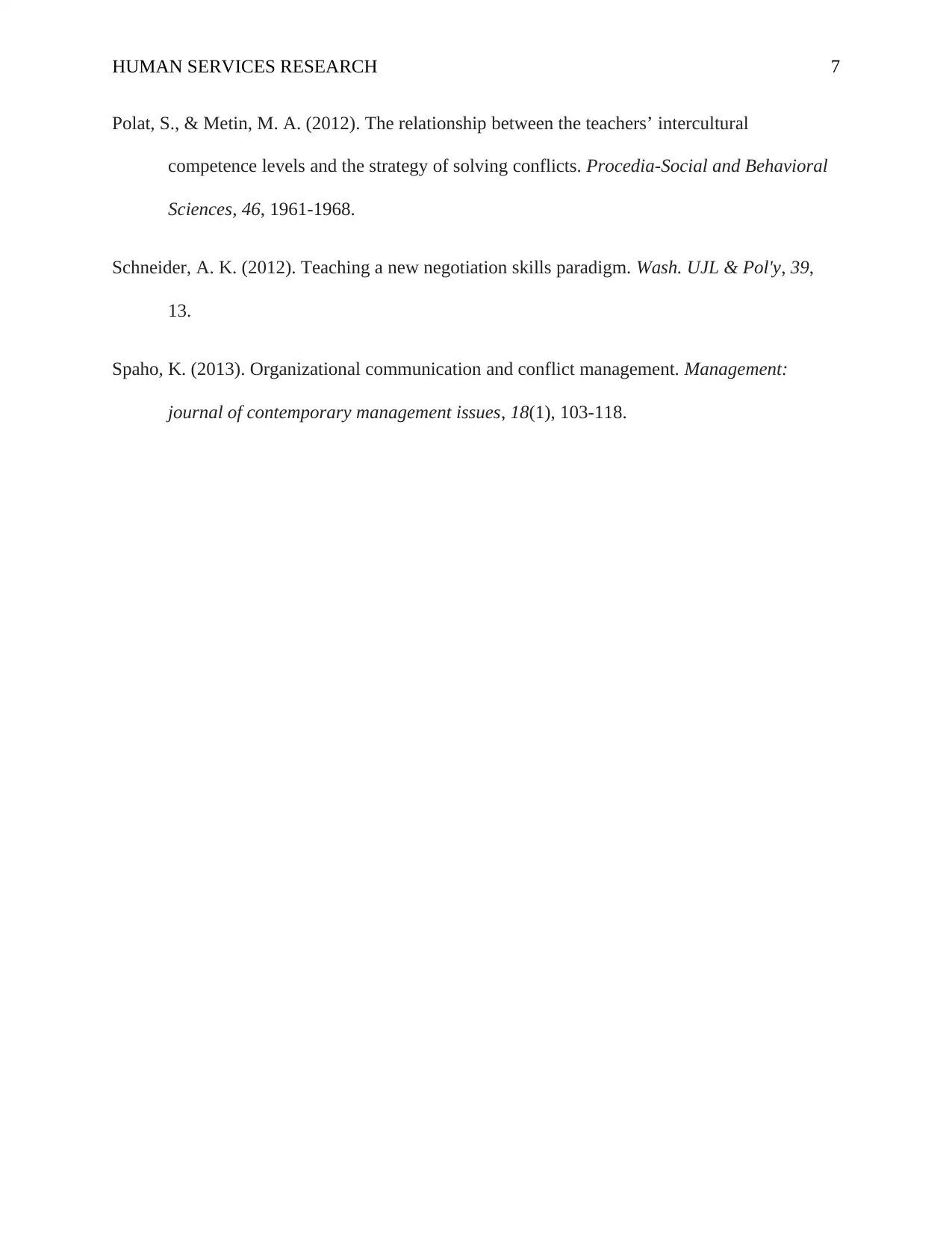
HUMAN SERVICES RESEARCH 7
Polat, S., & Metin, M. A. (2012). The relationship between the teachers’ intercultural
competence levels and the strategy of solving conflicts. Procedia-Social and Behavioral
Sciences, 46, 1961-1968.
Schneider, A. K. (2012). Teaching a new negotiation skills paradigm. Wash. UJL & Pol'y, 39,
13.
Spaho, K. (2013). Organizational communication and conflict management. Management:
journal of contemporary management issues, 18(1), 103-118.
Polat, S., & Metin, M. A. (2012). The relationship between the teachers’ intercultural
competence levels and the strategy of solving conflicts. Procedia-Social and Behavioral
Sciences, 46, 1961-1968.
Schneider, A. K. (2012). Teaching a new negotiation skills paradigm. Wash. UJL & Pol'y, 39,
13.
Spaho, K. (2013). Organizational communication and conflict management. Management:
journal of contemporary management issues, 18(1), 103-118.
1 out of 7
Related Documents
Your All-in-One AI-Powered Toolkit for Academic Success.
+13062052269
info@desklib.com
Available 24*7 on WhatsApp / Email
![[object Object]](/_next/static/media/star-bottom.7253800d.svg)
Unlock your academic potential
Copyright © 2020–2025 A2Z Services. All Rights Reserved. Developed and managed by ZUCOL.





